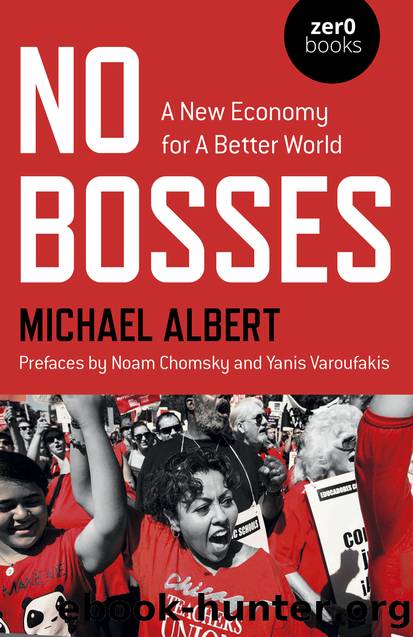No Bosses by Michael Albert;

Author:Michael Albert;
Language: eng
Format: epub
Publisher: National Book Network
Published: 2021-09-10T00:00:00+00:00
An Anti-Academic Addendum
Perhaps you have had the experience of taking an economics course in college or have otherwise heard economists claim that markets permit producers and consumers to fulfill their desires without external imposition, without waste, and supremely efficiently. Economists even prove that a mathematical model that they say captures the essence of market exchange has these delightful properties.
The problem is that their model and the reality they say their model âmodelsâ diverge dramatically. Imagine that I model war as including many people, severe disagreement, a few guns, and no dying. Then I examine my model for the properties of war. My model leaves out too much that matters. Economic theory is like that.
Briefly, the economistsâ model assumesâamong other falsehoodsâthat market buyers and sellers are all small and weak and unable to themselves affect prices. It also simplistically models their behavior as maximizing profit or surplus and maximizing personal preference fulfillment, and it then proves the model will have various properties. For example, it wonât waste things. Yet strangely, in our economy 40 percent of all produced food is wasted. That aloneâand there are many such glaring gaps between claims about the model and facts of worldly outcomesâshould terminate people pointing to such models instead of pointing to reality to learn about reality. It does that, at least to an extent, for some high-powered more realistic economists, but not for the economics we learn in economics 101 or from media punditsâ rhetoric.
Further, and more instructively, even if reality did act like the economic models and thus did attain what the models call âefficiency,â what is that? The word efficiency is used by economists and their business paymasters to rally support for whatever they favor, but the word is rarely carefully considered. We all like efficiency when we think it means attaining desired ends without wasting things we value. Who would oppose that? No one wants to not attain what we seek. No one wants to waste what we value. And so no one wants to be called inefficient. But here is the rub.
Efficiency really means attaining the ends you seek, whatever those may be. It means not wasting things you value, whatever anyone else may think about the things you value. So, if you seek profit and you donât value the lives of workers or the health of your workplace neighbors, you should cut workersâ pay and speed up workersâ tasks while you scrimp on their safety and simultaneously dump waste into neighboring water supplies or spew it into the sky. In fact, given market aims and what markets do and donât value, for workplaces to not impoverish workers and to not dump pollution would be âinefficient.â
Typical economists overly abstract their models. They leave out workersâ well-being, social relations, and the environment. They then use the label efficient to appear credible and curry favor. Economists who do this are either incredibly stupid, or they know better but have succumbed to the pressure of accommodating those who pay their salaries or publish their writings.
Download
This site does not store any files on its server. We only index and link to content provided by other sites. Please contact the content providers to delete copyright contents if any and email us, we'll remove relevant links or contents immediately.
Machine Learning at Scale with H2O by Gregory Keys | David Whiting(3627)
Harry Potter and the Goblet Of Fire by J.K. Rowling(3609)
Never by Ken Follett(3528)
Unfinished: A Memoir by Priyanka Chopra Jonas(3205)
Fairy Tale by Stephen King(2949)
The Man Who Died Twice by Richard Osman(2808)
Will by Will Smith(2580)
Rationality by Steven Pinker(2149)
The Dark Hours by Michael Connelly(2076)
The Storyteller by Dave Grohl(2062)
It Starts With Us (It Ends with Us #2) by Colleen Hoover(2036)
The Dawn of Everything: A New History of Humanity by David Graeber & David Wengrow(2017)
Can't Hurt Me: Master Your Mind and Defy the Odds - Clean Edition by David Goggins(2003)
Friends, Lovers, and the Big Terrible Thing by Matthew Perry(1992)
The Stranger in the Lifeboat by Mitch Albom(1935)
The Becoming by Nora Roberts(1916)
Cloud Cuckoo Land by Anthony Doerr(1912)
New Morning Mercies: A Daily Gospel Devotional by Paul David Tripp(1813)
Love on the Brain by Ali Hazelwood(1811)
